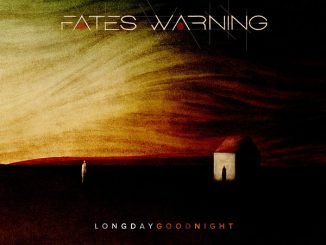[Metal Blade Records, 2020]

Intro: Tasos Poimenidis
The Germans The Ocean Collective (known as The Ocean until very recently) were formed in 2000, and their first full-length album, Fluxion, was released in the distant 2004. From the beginning they were a sludge / post-hardcore band that stood out, both stylistically and musically, and due to high level of technique of its members and the progressive elements that grew from album to album. The only permanent member and leading figure of the band is guitarist Robin Straps, while over the years they have been consistent in frequency and quality with Precambrian (2007), Pelagial (2013), and Phanerozoic I: Palaeozoic (2018) being highly regarded by their fans. This year’s Phanerozoic II: Mesozoic | Cenozoic completes the loose concept of Phanerozoic I, and the singles showed that it is an album worthy of attention.
The strange and beautiful world of The Ocean Collective
It took less than two years for these talented Germans to return with a new album. The successor to the great Phanerozoic I: Palaeozoic is here and it’s almost on par with its predecessor. Guitarist, main composer, and mastermind of The Ocean Collective, Robin Straps, continues to be one of the most remarkable musical minds out there. However, as in any collective that respects its structure, the de facto leader is not the protagonist but rather the director / screenwriter. Thus, with the same – now stable – line-up (the only new band member is guitarist David Ramis Åhfeldt) the scene is set, and it has many different protagonists.
The two obvious ones that come to mind after the first spins are the technical monster Paul Seidel (drums) who is one of the strongest cards on the record with his complex playing, and Loïc Rossetti, this passionate frontman who seems to be the ideal singer of Straps’ concepts, especially in the heavier parts of the record. Mattias Hagerstrand’s bass is crucial, which sometimes works as another rhythm guitar, and fills the quietest parts superbly.
The album brings out a very intense progressive side of The Ocean, in places much more melodic than their old works, something that was also evident in Phanerozoic I. If one tries to describe The Ocean, Mastodon and Tool will inevitably be mentioned. Although they are one of the main components (let’s not forget that The Ocean was one of the first sludge bands from Europe), these are not the only influences on the album (e.g. Eocene and Oligocene have nothing to do with the aforementioned). Sludge, progressive metal, post-metal, groove parts, and extreme metal coexist in a common musical world into which Straps and his companions guide the listener.
Straps’ lyrics, perfectly expressed by the very expressive Rossetti, and the guests Jonas Renkse (Jurassic | Cretaceous), Tomas Liljedahl (Palaeocene – he also wrote the lyrics), and Seidel himself (Holocene), are once again centered on topics such as philosophy and the emotional and mental world of the individual, while the song titles are rather allegorical.
The tracks that stand out are the opening Triassic, Jurassic | Cretaceous, which are also the most epic and adventurous in the album with many changes and quite elaborate heavy points, as well as the astonishing single Pleistocene with Rossetti’s voice and Dalai Theofilopoulou’s cello stealing the show in its first part, while the second half is one of the most amazing black metal (oh yes!) songs in recent years. The post-rock / metal elements throughout the album take the listener on a journey, a charisma that the Germans have always had, while the heaviest parts will make him headbang to their rhythms.
The album has no striking weaknesses, although the compositions are not exactly equally great. Apart from the more epic tracks, there is a shift to shorter durations, and despite its complex material, the album flows very fast, like its predecessor. The variety of instruments (cello, piano, trombone among others) and compositions will reward the listener for a long time. The old fans of the band found another album to love, and the new ones found another opportunity (along with Phanerozoic I) to enter smoothly and ideally into the strange and beautiful world of The Ocean Collective.
8.5 / 10
Tasos Poimenidis
2nd opinion
For more than a decade now, the Germans The Ocean have managed to establish themselves as a collective that delivers consistently quality releases to the European progressive music scene, with consistent and always ambitious prospects for their every next step, e.g. the giant epic Precambrian (2007), the two releases that followed (Heliocentric, Anthropocentric, 2010), or even the previous first part of Phanerozoic (2018). With the theme continuing to draw inspiration from geology, the second part unveils a further evolution of the Ocean phenomenon. As geological ages change, so do the moods and speeds. The album opener, Triassic, starts the melodic journey, and then the experimentation, the strings, the keys, the heavy guitars, the progressive glances through the post-meets-sludge past of The Ocean leave space for Loic Rossetti’s voice to highlight the compositions. The element that impresses once again is the quality of all compositions and the band’s unstoppable evolutionary course, knowing how capable they are of creating great albums. The change in the atmospheric direction of Phanerozoic II is also an element that takes its flow to the next level. From the impressive Jurassic | Cretaceous to Pleistocene the “geological distance” is a few tens of millions of years, and from Precambrian to Phanerozoic I-II a decade or so; The Ocean manage to present a consistent continuum with the know-how of a band that seems determined not to stop surprising.
9 / 10
Panos Papazoglou
[Metal Blade Records, 2020]

Εισαγωγή: Τάσος Ποιμενίδης
Οι Γερμανοί The Ocean Collective (μέχρι πολύ πρόσφατα γνωστοί ως The Ocean) υπάρχουν ως σχήμα από τις αρχές του 2000 με πρώτη επίσημη δισκογραφική δουλειά τους το Fluxion στο μακρινό πλέον 2004. Από την αρχή της σύλληψης τους υπήρξαν μια sludge / post-hardcore μπάντα που ξεχώριζε από τον σωρό, τόσο από στυλιστικής και μουσικής άποψης όσο και από το υψηλό εκτελεστικό επίπεδο των μελών της και τις progressive αναφορές που γιγαντώνονταν από album σε album. Μόνο σταθερό της μέλος και ηγετική μορφή είναι o κιθαρίστας Robin Straps, ενώ μέσα στα χρόνια έχουν υπάρξει συνεπείς σε συχνότητα κυκλοφοριών και ποιότητα με τα Precambrian (2007), Pelagial (2013) και Phanerozoic I: Palaeozoic (2018) να χαίρουν ιδιαίτερης εκτίμησης στους κύκλους των οπαδών τους. Το φετινό Phanerozoic II: Mesozoic | Cenozoic έρχεται να ολοκληρώσει το loose concept του Phanerozoic I και από τα singles ακόμη φάνηκε ότι είναι μια δουλειά άξια προσοχής.
Ο περίεργος και όμορφος μουσικός κόσμος των The Ocean Collective
Λιγότερο από δύο χρόνια πήρε στους πολυτάλαντους Γερμανούς που απαρτίζουν τους The Ocean Collective για να επιστρέψουν δισκογραφικά. Ο διάδοχος του εξαιρετικού Phanerozoic I: Palaeozoic είναι εδώ και είναι σχεδόν ισάξιος του προκατόχου του. Ο Robin Straps, κιθαρίστας, βασικός συνθέτης και οραματιστής των The Ocean Collective, συνεχίζει να είναι από τα πιο αξιόλογα μουσικά μυαλά εκεί έξω. Παρόλα αυτά, όπως σε κάθε κολεκτίβα που σέβεται την δομή της, ο de facto leader δεν είναι ο πρωταγωνιστής αλλά μάλλον ο σκηνοθέτης / σεναριογράφος. Εδώ λοιπόν με το ίδιο – σταθερό πλέον – line-up (μόνο καινούριο επίσημο μέλος ο David Ramis Åhfeldt στην κιθάρα που μονιμοποιήθηκε πλέον) στήνεται ένα σκηνικό που έχει πολλούς και διάφορους πρωταγωνιστές.
Οι δυο προφανείς που έρχονται στο μυαλό με τις πρώτες ακροάσεις είναι το τέρας τεχνικής Paul Seidel (ντραμς) που με το πολυσύνθετο παίξιμό του είναι από τα πιο δυνατά χαρτιά του δίσκου και ο Loïc Rossetti αυτός ο παθιασμένος frontman που μοιάζει να είναι ο ιδανικός εκφραστής των concepts του Straps, ειδικότερα στα πιο σκληρά σημεία του δίσκου. Από κοντά στέκεται και ο Mattias Hagerstrand με το μπάσο του που άλλοτε λειτουργεί σαν μια ακόμη ρυθμική κιθάρα και άλλοτε γεμίζει με εξαιρετικό μπασιστικό τρόπο τα πιο ήρεμα σημεία.
Ο δίσκος βγάζει μια πολύ έντονη progressive πλευρά των Ocean, σε σημεία πολύ πιο μελωδική από τις παλιές τους δουλειές κάτι που είχε που φανεί και στο Phanerozoic I. Αν κάποιος προσπαθήσει να περιγράψει τους Ocean, αναπόφευκτα τα σχήματα των Mastodon και Tool θα αναφερθούν εδώ. Παρότι είναι από τις κύριες συνιστώσες (μην ξεχνάμε ότι οι The Ocean ήταν από τις πρώτες sludge μπάντες που ξεπήδησαν στην Ευρώπη) δεν είναι οι μόνες που συναντά κανείς στον δίσκο (αρκεί να ακούσει κανείς λόγου χάρη τα Eocene και Oligocene που καμία σχέση δεν έχουν με τους προαναφερθέντες). Sludge, progressive metal, post-metal, groove σημεία και ακραίο metal συνυπάρχουν σε ένα κοινό μουσικό κόσμο στον οποίο οδηγεί ο Straps και οι συνοδοιπόροι του τον ακροατή.
Οι στίχοι του Straps, ερμηνευμένοι τέλεια από τον εκφραστικότατο Rossetti, αλλά και τους guests Jonas Renkse (Jurassic | Cretaceous), Tomas Liljedahl (Palaeocene – υπεύθυνος και για τους στίχους) και τον ίδιο τον Seidel (Holocene) συνεχίζουν να μιλάνε για βαθιά θέματα, όπως τον συναισθηματικό και τον ψυχικό κόσμο του ατόμου και τη φιλοσοφία, ενώ οι τίτλοι λειτουργούν μάλλον αλληγορικά.
Κομμάτια που θα ξεχωρίσει ο ακροατής είναι τα εναρκτήρια Triassic, Jurassic | Cretaceous, τα οποία είναι και τα πιο επικά και περιπετειώδη μέσα στο δίσκο με πολλές εναλλαγές και αρκετά περίτεχνα και σκληρά σημεία, καθώς και το συγκλονιστικό single Pleistocene που το πρώτο του μισό έχει τις ερμηνείες του Rossetti και το τσέλο της Dalai Theofilopoulou να κλέβουν την παράσταση, ενώ το δεύτερο μισό του είναι από τα πιο συγκλονιστικά black metal (καλά διαβάσατε) κομμάτια των τελευταίων ετών. Τα post-rock / metal σημεία σε όλο τον δίσκο ταξιδεύουν τον ακροατή, ένα χάρισμα που το είχαν ανέκαθεν οι Γερμανοί, ενώ τα σκληρότερα σημεία θα τον κάνουν σε λίγα δευτερόλεπτα να έχει τη διάθεση να χτυπηθεί στους ρυθμούς τους.
Αδυναμίες χτυπητές δεν θα βρει κανείς, αν και ο δίσκος δεν έχει ακριβώς ισοϋψείς συνθέσεις με κάποια κομμάτια να υστερούν λίγο σε σχέση με τα πιο δυνατά της δουλειάς αυτής. Πέρα από τα πιο epic κομμάτια, έχει γίνει μια στροφή σε πιο μικρές διάρκειες, ενώ συνολικά ο δίσκος – παρά το δύσκολο υλικό του – κυλάει πολύ γρήγορα, όπως και ο προκάτοχός του. Η ποικιλία σε όργανα (μεταξύ άλλων σημεία με τσέλο, πιάνο, τρομπόνι) και σε συνθέσεις θα αποζημιώνει τον ακροατή για καιρό. Οι σταθεροί φίλοι του σχήματος βρήκαν έναν ακόμη δίσκο για να κολλήσουν, οι καινούριοι μια μοναδική ευκαιρία (μαζί με το Phanerozoic I) να μπουν με ομαλό και ιδανικό τρόπο στον περίεργο και όμορφο μουσικό κόσμο των The Ocean Collective.
8.5 / 10
Τάσος Ποιμενίδης
2η γνώμη
Οι Γερμανοί The Ocean σε πάνω από μια δεκαετία πλέον, έχουν καταφέρει να εδραιωθούν ως μια κολεκτίβα που προφέρει σταθερά ποιοτικές κυκλοφορίες στο ευρωπαϊκό μουσικό προοδευτικό στερέωμα, με συνέπεια και πάντα φιλόδοξες προοπτικές για το εκάστοτε επόμενο βήμα τους, είτε αφορά το γιγαντιαίο έπος Precambrian (2007), τις δύο κυκλοφορίες που ακολούθησαν (Heliocentric, Anthropocentric, 2010) ή ακόμα και το προηγηθέν πρώτο μέρος του Phanerozoic (2018). Με τη θεματολογία να συνεχίζει να αντλεί έμπνευση από τη γεωλογία και να παραπέμπει στην ορολογία της, το δεύτερο μέρος συνεχίζει με εντυπωσιακό ρυθμό την εξέλιξη του φαινομένου των Ocean. Με τις εποχές να εναλλάσσονται, οι διαθέσεις και οι ταχύτητες ακολουθούν παράλληλα, με το εναρκτήριο Triassic να εκκινεί μελωδικά το ταξίδι του δίσκου και στη συνέχεια ο πειραματισμός, τα έγχορδα, τα πλήκτρα, οι heavy κιθάρες, οι προοδευτικές ματιές μέσα από το post-meets-sludge παρελθόν των Ocean αφήνουν το χώρο στις ερμηνείες του Loic Rossetti να αναδείξουν τις συνθέσεις. Το στοιχείο που εντυπωσιάζει ξανά είναι η ποιότητα στο σύνολο των συνθέσεων και η ασταμάτητη εξελικτική πορεία στην οποία καθοδηγούνται, με την ασφάλεια του να γνωρίζουν οι ίδιοι πόσο μεγαλεπήβολα έργα είναι ικανοί να δημιουργήσουν. Και η εναλλαγή στην ατμοσφαιρική κατεύθυνση του Phanerozoic II είναι ξανά ένα στοιχείο που απογειώνει τη ροή του. Από το εντυπωσιακό Jurassic | Cretaceous, στο Pleistocene η «γεωλογική απόσταση» είναι μερικές δεκάδες εκατομμύρια χρόνια και από το Precambrian στα Phanerozoic I-II μια δεκαετία και βάλε. Οι Ocean καταφέρνουν να παρουσιάσουν μια συνεπή συνέχεια με την τεχνογνωσία ενός συγκροτήματος που δείχνει αποφασισμένο να μη σταματήσει να εκπλήσσει.
9 / 10
Πάνος Παπάζογλου




